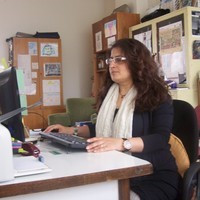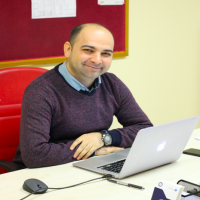Research Article
Review Article
Theoretical Article
Book Review
Issue Reviewers





Fırat Üniversitesi, İktisadi ve İdari Bilimler Fakültesi, Sosyal Hizmet Bölümünde Dr. Öğr. Üyesi olarak görev yapmaktadır.
Ana Uzmanlık Alanları: Ailelerle Sosyal Hizmet; Aile Danışmanlığı; Aile Terapileri; Kabul ve Kararlılık Terapisi; Çözüm Odaklı Terapi; Klinik Sosyal Hizmet; Medya, Dijitalleşme ve Sosyal Hizmet

Dr & Dr Tülây ATAY currently teaches at Hatay Mustafa Kemal University (HMKU), Antakya, Hatay, Faculty of Communication, Department of Journalism as a faculty member (Assistant Professor) and a researcher. She is a Turkish Citizen. She was born and bred in Istanbul, Turkey and graduated from Istanbul University. She holds a BA degree in Mass-Media Communication & Journalism & PR. She has a Master’s degree in Cultural Anthropology and Gender & Women’s Studies. She is a co-author of the book called “Gender & Sex and Taboo in the Contemporary Primitive & Traditional Societies” in the Turkish Language based on her MA thesis. The book is written from the perspective of women’s and gender studies. She was one of the co-founders of the Centre for Women’s Studies of Mustafa Kemal University. She served and was in charge as one of the deputy directors of the Centre for Women’s Studies of Mustafa Kemal University, Antakya, Hatay, Turkey. She previously worked as a “business developer” for many SMEs in the various fields such as automotive, textile etc. She worked as an Assistant Producer for Turkish Radio Television State Company (TRT) between 1995-1996. She earned her PhD from the Department of Agriculture Economics and Extensions at Çukurova University, Adana, Turkey in October 2013. She produced her Ph.D. thesis on the division of labour amongst ethnically different two villages near Hatay province in the context of changing social life and Women’s & Gender Studies. Tülay’s areas of interests are women empowerment and women’s studies using other disciplines. She is holding a sociology BA degree obtained from Open Faculty, Anadolu University, Eskişehir, Turkey. She is a PhD candidate at Journalism, İstanbul University, İstanbul, Turkey. She was a temporary National Gender Consultant for Food and Agriculture Organization of the United Nations (FAO). She lived in the UK and USA for a while. She has been in Portugal, Slovenia, Ukraine, Scotland, Romania, Holland, Italy, Spain, Estonia, UAE, Malaysia, Poland, Czeck Republic and France for academic purposes. She is a single mom and, has an adorable daughter, Dafne (Daphne, the nymph) who has been an exchange student and 11th grader at Halifax West High School, Halifax, Nova Scotia, Canada. They have been living happily in Antakya, Hatay, Turkey since 1998. She was a scientist-in-residence at Paris Lodron University of Salzburg financially supported by GendUp and Salzburg Stadt (Municipality), Salzburg, Austria. She is also currently engaging with the FoTRRIS-H2020 project (women and immigration) run by Complutense University of Madrid. She recently chaired the MEDCOM 2017, KL, Malaysia.

1984 İstanbul doğumludur. Lisans eğitimini İstanbul Üniversitesi Sosyoloji Bölümü ve Çalışma Ekonomisi ve Endüstri İlişkileri Bölümü'nde tamamlamıştır. Yüksek lisans ve doktora derecesini Paris 1 Panthéon-Sorbonne Üniversitesi'nde almıştır. 2016 yılından beri Kütahya Dumlupınar Üniversitesi'nde görev yapmaktadır. Güncel olarak göç ve vatandaşlık üzerine çalışmaktadır.


Dr. İlker KABA, Ankara Üniversitesi Rehberlik ve Psikolojik Danışmanlık Bölümünde lisans eğitimini, Hacettepe Üniversitesi Psikolojik Danışma ve Rehberlik Bölümü’nde ise master ve doktora eğitimlerini tamamlamıştır. Uzmanlığını “Öğrencilerin Üniversiteye Uyumlarında Psikolojik Dayanıklılık ve Psikolojik Belirtiler” başlıklı yüksek lisans tezi ile; doktor unvanını ise "Ergenlerde Teknoloji Kullanımının Öz-Belirleme Kuramı Temelinde İncelenmesi" başlıklı doktora tezi ile almıştır.
2009 yılından bu yana aktif olarak meslek hayatının içindedir. Çalıştığı kurumlar ve pozisyonları şu şekildedir:
*Özel Eğitim ve Rehabilitasyon Merkezi (Psikolojik Danışman)
*Türk Silahlı Kuvvetleri bünyesindeki RDM'ler (Subay&Uzman Psikolojik Danışman)
*Özel PDR Merkezi (Uzman Psikolojik Danışman)
*Özel Okullar/Lise Kademesi (Uzman Psikolojik Danışman)
*Özel Okullar/Lise Kademesi (Uzman Psikolojik Danışman & PDR Bölüm Başkanı & Yurt İçi Üniversite Danışmanı)
*Özel Okullar/Lise Kademesi (Doktor Psikolojik Danışman)
Ergen, yetişkin, aile, kariyer ve okul psikolojik danışmanlığında uzman olan İlker KABA’nın, Aile Danışmanlığı, Wisc-R Çocuklar İçin Zeka Testi, Minnesota Çok Yönlü Kişilik Envanteri (MMPI), Stres ve Öfke Yönetimi, Etkili Mülakat Teknikleri, Kişilik Analizi ve Değerlendirme, Temel ve İleri Hipnoz Eğitimi, EMDR ve Belbin Getset Davranış Envanteri gibi sertifikaları/uygulama belgeleri mevcuttur.
Kognitif ve Davranış Terapileri Derneğinden Bilişsel Davranışçı Terapi Eğitimi almıştır.
KPSS Eğitim Bilimleri Kitabında yayınlanmış bir kitap bölümü, Ulusal Eğitim Bilimleri Kongresinde sunduğu bildirisi, hakemli ulusal indeksli dergilerde yayınladığı 3 makalesi, hakemli uluslararası indeksli dergilerde yayınladığı 6 makalesi vardır. Ayrıca geliştirmiş olduğu 2 adet ölçeği bulunmaktadır: Yetişkin Yaşam Doyumu Ölçeği (2018) ve Bilişim Teknolojileri Kullanım Ölçeği (2021).
Halen Bilkent Erzurum Laboratuvar Okulu (BELS) Lisesinde Dr. Psikolojik Danışman olarak çalışmaktadır.
Türk Psikolojik Danışma ve Rehberlik Derneği (TÜRK PDR-DER) üyesidir.
Kognitif ve Davranış Terapileri Derneği (KDTD) üyesidir.
Türkiye Özel Okullar Derneği (TÖZOK) Rehberlik Komisyonu üyeliği yapmıştır.
Evlidir ve bir çocuk babasıdır.
email: ikabapdr@gmail.com
instagram.com/dr.ilkerkaba
web sayfası: https://sites.google.com/view/ilkerkaba
Aim & Scope
The aim of JOWF is to promote academic studies of all aspects of women and/or family, to develop the dialogue between the researchers who have multi-disciplinary studies in this field. Moreover, another objective of the journal is to contribute to the production and accessibility of the theoretical, methodological, empirical and case studies.
JOWF is dedicated to the scholarly study of all aspects of women, family and/or gender studies. The articles, reviews and book critics are accepted from all disciplines such as sociology, psychology, educational sciences, health sciences, political sciences, law, anthropology, media and communication, theology, history, economics, management, tourism, etc.
Author Guidelines
Language
The publication languages of the journal are Turkish and English.
Preparation of Articles and Writing Rules
All correspondence regarding the articles sent to the journal will be made with the corresponding author. Article submission must be made via Dergipark. Submitted manuscripts must be sent by attaching the Final Check List, Cover Page, Ethics Committee Document, Plagiarism Report and Copyright Agreement Form signed by all authors, indicating the type of publication and containing details about the publication.
Articles should be prepared using the "Article Template". In accordance with the double-blind referee process, the identity information of the author(s) should not be included in the main text of the article.
The abstract should be between 150-250 words in Turkish and English. Abstract and Abstract must be understandable and grammatically correct.
There should be 3-5 Turkish keywords representing the content of the study under the Turkish abstract. There should be 3-5 English keywords representing the content under the English abstract.
Studies must mainly contain the following elements: Turkish title, abstract and keywords; English title, abstract and keywords; main text sections, references, tables and figures.
Article Types
Research Articles:
Research articles are articles that report research that provides important, original scientific results on topics appropriate to the scope of the journal. Original research articles consist of Abstract, Keywords, Introduction, Method, Findings, Discussion, Conclusion and Recommendations, References sections and Tables, Graphs and Figures.
• Abstract: Original research articles must contain Turkish and English abstracts not exceeding 250 words. The abstract section should be prepared without any subheadings.
• Keywords: Research articles should be submitted with at least 3 and at most 5 keywords. Key words should be prepared in English and Turkish and written under the relevant abstract. Keywords should be written in alphabetical order, using commas between them.
• The article should be written in Segoe UI font, 10 point font, justified, and a bibliography should be cited at the end of the article.
Paragraph text should be 6 pt before, 6 pt after, justified between paragraphs, line spacing should be 1.15.
Page layout is normal, page structure is 2.5 cm from the top, 2.5 cm from the bottom, left 2.5 cm, right 2.5 cm, gutter 0, header 1.25 cm. Footer should be 2.5 cm.
Subheadings should be aligned with the heading before them. Page numbers should not be given.
• Submitted articles must be between 5000-10,000 words, excluding bibliography and appendices.
• Articles should be organized according to the APA 6 reference system.
• Pictures: They must be high resolution and the rules of shape must be followed in naming the pictures. The URL must be given for images taken from the internet.
• Acknowledgments: If people or institutions are thanked, they should be given before the sources. In articles, if there is a conflict of interest, financial support, donation and all other editorial (statistical analysis, English/Turkish evaluation) and/or technical assistance, it should be stated at the end of the text.
• Ethics Committee Permission Information: Ethics Committee Report regarding all studies requiring Ethics Committee Permission must be sent with the publication. Additionally, as stated in the template, information must be added to show that the publication is written in accordance with the "Higher Education Institutions Scientific Research and Publication Ethics Directive".
• The language to be used in articles and writings published in the journal is Turkish or English. An extended abstract is required for articles written in both languages. The abstract should be prepared as a holistic text between 750-1000 words, including the purpose, scope, method, findings, analysis and results of the article, and should be added to the end of the article and uploaded to the system as a single file.
Compilation
Articles prepared by experts who have knowledge on the subject of the article and whose knowledge is reflected in the international literature in the form of publications and citations are evaluated. Authors may also be invited by the journal. It should be prepared in a format that explains, discusses and evaluates the latest level of knowledge or a subject and guides future studies. The review article should consist of title, abstract and keywords, main text sections and references.
Book Review
OKAD publishes Turkish and English introductions and reviews of the works published in the last two years. Each issue will contain a maximum of 1 book review. The article that the editorial board finds appropriate is sent to the relevant referee. The article that the referee finds appropriate is published. A book introduction should be a critical evaluation of a work, not just a summary of it. The author promoting the book may agree with the book or disagree with the book's ideas, or point out what is exemplary or lacking in the information, judgments or structure the book presents. The author who promotes the book should also clearly express his thoughts about the book. In the title information, the name of the work being promoted or reviewed, its author, the city and publishing house where it was published, the year of publication, how many pages it is and the ISBN number should be written. The author's name and SURNAME are written one line below the title information, at the end of the introduction or review, with a description sign aligned to the right. Other article rules (font size, etc.) apply to the rest of the text.
When the publication submitted for publication is accepted, a cover page containing author information must be sent. The cover page should include the title of the article, the institutions and titles to which the author(s) are affiliated, their addresses, mobile, work and fax numbers, ORCID and e-mail addresses (see Final Checklist).
All legal responsibilities regarding the articles published in Ondokuz Mayıs University Journal of Women and Family Studies belong to the author(s).
The editor has the right to make correction suggestions for the articles sent to Ondokuz Mayıs University Journal of Women and Family Studies, and to publish or not publish the articles. Uploaded and saved articles are first examined by the editorship in the context of the Journal Writing and Publishing Principles. If there are parts that need to be corrected by the author, the article is returned to the author and editing is requested.
Articles approved by the editorial board of Ondokuz Mayıs University Journal of Women and Family Studies are sent to at least two referees through the same system. If necessary, the study may be reviewed by more than two referees. The final decision regarding the study to be published is made by taking into account the opinion of the majority of the referees. Referees' suggestions are followed meticulously by the editor. In studies submitted for evaluation, the names of the author(s) and referees are kept mutually confidential.
Referees may request to see the version of the article they want corrected before it is published. In this case, the arbitration process continues.
The editorial board monitors the referees' submission of their reports within the specified time. If the reports are not received within the specified time, a new referee is appointed for the article by the editorial board.
Click to download the template file
Click for the journal copyright transfer form
Click for the cover file
Ethical Principles and Publication Policy
Committee on Publication Ethics (COPE) "Code of Conduct and Best Practice Guidelines for Journal Editors" and "Code of Conduct for Journal Publishers" principles have been adopted.
Ethical Principles and Publication Policy
All submitted publications must be original, unpublished and not under evaluation in another journal. Each article must be sent through a plagiarism program (Turnitin or iThenticate) by the author(s). Articles with a plagiarism (similarity) rate above 15% are not taken into consideration. The following points should be taken into consideration when reporting the file uploaded to the plagiarism detection program:
Bibliography excluded
Quotes included or Quotes excluded
Except for text parts with overlap of less than 7 words (Limit match size to 7 words)
Select "No Repository" for the "Send Assignments to" option under the "Optional Settings" tab. Plagiarism (Similarity) Rate Report of Publications and Ethics Committee Approval must be sent with the publication.
Publishing Rights Transfer Form:
When submitting the publication to the journal, all authors must sign and submit the Copyright Transfer Form.
Responsibilities of Editors and Reviewers
The editor evaluates the publications sent to the journal independently of the authors' ethnicity, gender, gender orientation, nationality, religious beliefs and political philosophies. They ensure that submitted articles undergo double-blind peer review in a fair manner. They ensure that all information regarding the submitted article is kept confidential until it is published.
Each publication sent to OKAD must be approved by at least two referees who are experts in their field and must be deemed publishable by the referees. A publication copyright agreement must be filled out for studies uploaded to the system to be published in our journal. Academicians and scientific researchers who want to take part in our journal's referee and scientific committees must be experts in their fields. The journal scientific board constitutes the highest decision-making and executive mechanism of the journal. Any decision taken by the scientific committee is final and unchangeable. The journal editor can decide whether the studies that are not sent for referee approval will be accepted in the journal and whether they will be sent to the referee process.
Information about the transaction process for JOWF is notified to the authors and authors in writing on the journal website. The start of the referee process is carried out under the control of the editor. The editor has the authority to inform and decide on the publication's referee process in the journal. A publication that the editor does not find appropriate or accept is not included in the process in the journal. Even if it is approved by the referee, if the editors or the scientific committee of the journal do not express a positive opinion on the publication of the current study, it may be canceled by the decision of the committees, even if the article is published in the system. In such a case, the author or authors cannot impose any sanctions on the journal. All authority belongs unilaterally to the editor, the journal scientific board and the editorial board.
Reviewers should not have conflicts of interest regarding the research, the authors, and/or the financial sponsors of the research. They must make an impartial judgment as a result of their evaluation.
Author responsibilities
1) Author(s) must submit an original study to Ondokuz Mayıs University Journal of Women's and Family Studies.
2)Author(s) must submit their unpublished work.
3) It is unethical to submit studies to more than one journal at the same time. Author(s) should not submit an article that they have published or submitted for publication elsewhere.
4)Any conflict of interest must be clearly stated.
5) The accuracy of the data sources used in the development of the article should be acknowledged.
6)Any errors found during the pre-publication phase of the article or after its publication should be reported to the Editor immediately.
7) The author(s) must correctly cite the sources used while writing the article, in line with ethical principles.
8) The names of people who do not contribute to the article should not be written as authors, and changing the author order of an article applied for publication, removing or adding authors should not be recommended.
9)In case information or raw data regarding their articles is requested from the author(s) during the evaluation process, the expected information must be provided to the Editors.
10) The author(s) must document that they have received permission to use the data they use in their articles, permissions for research and analysis, or the approval of the participants on whom they conducted research.
11) The author(s) have received ethics committee approval for research that requires collecting data through quantitative or qualitative methods such as experiments, surveys, scales, interviews, observations, focus group studies, which require ethics committee decision; The name of the ethics committee, decision date and number should be stated on the first and last pages of the candidate article and in the method section, and the document showing the ethics committee decision should be uploaded to the system together with the application of the article. In addition, in case reports, information regarding the receipt of informed consent/consent form should be included in the article.
12) The author(s) must present evidence in the article that they have paid attention to ethical principles during the data collection process (such as obtaining permission from others to use their documents such as scales, surveys, photographs). It should be stated that articles comply with research and publication ethics and copyright regulations for intellectual and artistic works. If the research was conducted on human and animal subjects, it should be stated that the research was carried out in accordance with international declarations, guidelines, etc.
13) Ethics committee approval is not required from the author(s) for review articles. However, in articles that do not require an ethics committee decision, it should be stated on the first and last pages of the article and in the method section that an ethics committee decision is not required.
Price Policy
No fee is charged from the author or his/her institution under any name.
Publication of Application and Research Center of Women's and Family Studies
SAMSUN






